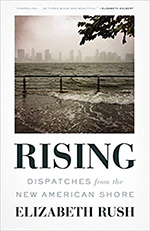 I’ve just finishing reading Rising, by Elizabeth Rush. The book is about sea level rise (subtitle: Dispatches from the New American Shore) and it was a finalist for the 2019 Pulitzer Prize for general nonfiction. It’s an interesting book – lyrical and artful, with evocative phrases like “osprey’s creosote shadow.” Occasionally, these can go beyond clever/poetic turns of phrase, and can invoke other corners of literature, as when she describes a flood survivor “floating on a couch in her wine-dark living room,” – a shout out to Homer’s frequent use of the phrase “wine-dark sea” (whatever that means).
I’ve just finishing reading Rising, by Elizabeth Rush. The book is about sea level rise (subtitle: Dispatches from the New American Shore) and it was a finalist for the 2019 Pulitzer Prize for general nonfiction. It’s an interesting book – lyrical and artful, with evocative phrases like “osprey’s creosote shadow.” Occasionally, these can go beyond clever/poetic turns of phrase, and can invoke other corners of literature, as when she describes a flood survivor “floating on a couch in her wine-dark living room,” – a shout out to Homer’s frequent use of the phrase “wine-dark sea” (whatever that means).
The book explores the biology and sociology of living in Pensacola, Miami, Jacobs Point, Rhode Island, Staten Island (New York), and Isle de Jean Charles, Louisiana, San Francisco Bay, as well as an interlude in an inland forest preserve in Oregon.
There are sections of the book that are essentially extended quotes from other people: testimonials that tell the person’s story without narrative filter. These feel kind of like “readings from the primary literature,” personal anecdotes told by those who were impacted by sea level rise. They are full of passion and fear, and very impactful emotionally. You feel the speaker’s pain, their sorrow. However, their parlance is at odds with Rush’s own lyricism, and alternating back and forth between them makes the reader compare the varied voices. It made me think of a scrapbook – a newspaper clipping here, and handwritten remembrance on the next page. The effect is to make Rising feel more like a collection than a cohesive through-going work of reportage.
The book features an extended discussion of sexual harassment from one of her sources, framed as part of a larger consideration of vulnerability. Rush is vulnerable as a woman reporter, conducting interviews in the field, and she draws parallels between that and the risk faced by people of limited means leaving in coastal wetlands. This is also invoked in a more extended analogy with the most vulnerable species leaving in increasingly flooded coastal wetlands. Our infrastructural footprint blocks them from migrating inland with the shore, so they feel the squeeze acutely and painfully. It’s not fair, but they have no good options.
Rising is a really personal book: In many places, Rush goes beyond mere reportage to describe her own emotional reaction to sea level rise. She reports on her own thoughts in the same way she reports on her interviews with coastal residents or scientists. She describes her dreams at length in several sections of the book. This is novel; the author’s midnight imaginings are outside the realm of typical nonfiction reporting. It’s simultaneously powerful and a bit uncomfortable in its intimacy. Is it legitimate to report on one’s own dreams in a book about sea level rise? I guess it is – not traditional source material, but powerful in the imagery it describes, the emotional state it draws the reader into. In sum, I’d say this is an interesting book from the perspective of considering the limits of traditional reporting and narration, and also a useful summary of where we are now with our submerging national coastlines.
